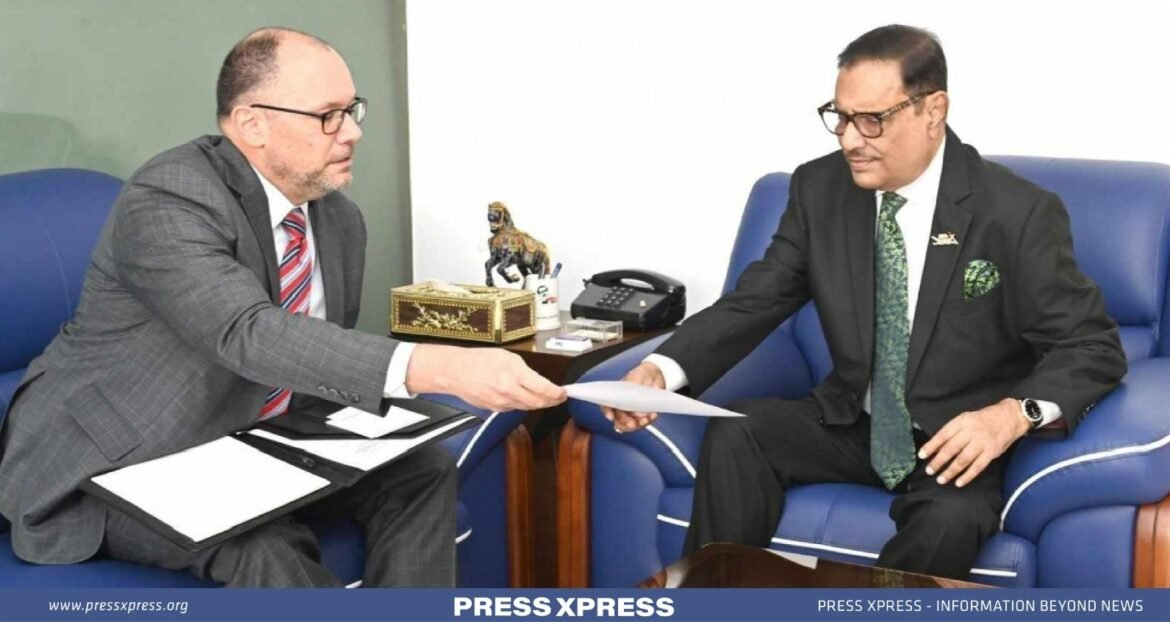Obaidul Quader clarified his stance by saying, ” “Contemplating dialogue is no longer an option. That opportunity has passed.”
Amidst the rising political tensions and the imminent announcement of election schedules by the Election Commission, the United States is advocating for a series of dialogues. On 15 November (2023), Awami League General Secretary and Minister of Road Transport and Bridges, Obaidul Quader rejected the possibility of engaging in dialogue with opposition parties to resolve the ongoing political deadlock. He made the comment following a meeting with US Ambassador Peter Haas who visited Obaidul Quader at the Secretariat to hand over an official letter – sent by US Assistant Secretary of State for South and Central Asian Affairs Donald Lu. The letter urged “dialogue without preconditions” among the three major parties – the Awami League, the BNP, and the Jatiya Party.
You can also read: BNP Survives on Rumors – Obaidul Quader
Expressing the government’s stance, Minister Obaidul Quader indicated that dialogue with opposition parties is not on the current agenda. Despite the international call for discussions, the minister asserted that a resolution to the political impasse must be sought through other means.
“When do we have the time for engaging in dialogues?” he posed a counter-question.
Quader expressed his intention to discuss the contents of the letter promptly with the Awami League’s party president, Sheikh Hasina, and other key party members. The rejection of dialogue raises questions about the trajectory of the political landscape and the potential for increased tensions in the coming days.
Earlier, The United States Ambassador to Bangladesh, Peter Haas, delivered a letter from Assistant Secretary of the State Department Donald Lu to the Awami League, BNP, and Jatiya Party. This move by the United States coincides with the upcoming announcement of the schedule for the 12th parliamentary election by the Election Commission on 15th November 2023. The exclusive nature of the invitation has caused unease among members of Bangladesh’s political spectrum.
US Intervention Sparks Concerns over Democratic Processes in Bangladesh
The reasons behind the selective inclusion of specific political parties and the potential impact of this intervention on the nation’s democratic processes warrant in-depth investigation. The issued invitation prompts inquiries into its underlying purpose and sparks worries about potential foreign interference in Bangladesh’s domestic affairs.
The exclusion of smaller yet influential groups from this discourse may provoke resentment and skepticism regarding its fairness. Such exclusivity has the potential to inadvertently undermine the legitimacy of any resulting agreements, as genuine political dialogue necessitates the involvement of all significant parties. The United States’ involvement and intervention may intensify political divisions. Considering Bangladesh’s current complex political environment, it is essential to acknowledge that sustainable solutions within a democratic system require a comprehensive and inclusive approach.
On Tuesday, November 14, Foreign Minister AK Abdul Momen stated that the government does not object to engaging in dialogue, but the key consideration is determining the dialogue partners.
Furthermore, after a meeting between Peter Haas and JP Chairman GM Quader, during which Haas personally delivered the letter to him, Mujibul Haque Chunnu, briefing journalists, outlined their position.
Chunnu stated, “We did not convey specific demands to the United States. I informed them that the election is our internal matter, and we will communicate our preferences to the Election Commission.”
He further explained, “The US ambassador brought a letter written by Assistant Secretary of State for South and Central Asian Affairs Donald Lu. He handed over the letter to our party chairman. Peter Haas mentioned that the same letter is being delivered to three parties – Awami League, BNP, and Jatiya Party.”
Both Foreign Minister Dr. AK Abdul Momen and Jatiya Party emphasize Bangladesh’s dedication to preserving democratic autonomy and internal decision-making while addressing the US proposal for talks.
US-Led Dialogue Initiative Raises Questions Amidst Bangladesh’s Political Unrest
Ambassador Haas, who previously maintained a cordial relationship with the BNP leadership before the violent events of October 28, had not previously broached the subject of political dialogue. This shift in approach prompts questions about the evolving dynamics and considerations at play, with some analysts suggesting the failure of the US to intervene before the onset of anarchy. The additional intrigue arises from the absence of inquiries from the US regarding the BNP’s violent activities.
Nevertheless, recent events, encompassing acts of violence, arson, and the unfortunate loss of a policeman, journalist, and activists in the past two weeks, have instigated a notable shift in the Awami League’s stance. During the 17-day period of strikes and blockades initiated by the BNP and its ally Jamaat-e-Islami as part of their anti-government movement, Bangladesh experienced 154 concerning incidents of arson attacks. Of these, at least 135 involved the torching of vehicles.

While the commendable offer of dialogue is acknowledged, political analysts in Bangladesh express curiosity about the timing and underlying motives of this initiative led by the United States, especially considering the absence of any prior intervention before the onset of anarchy.
Foreign Minister AK Abdul Momen reiterated a similar sentiment, stating that the government does not have reservations about holding dialogue, but the question remains regarding the appropriate dialogue partners.
Although BNP persists in engaging in violent activities, including instances of killings, throughout their anti-government movement, inquiries emerge regarding the stance of the United States on these actions. Despite being perceived as an advocate for peace, the US has conspicuously refrained from making statements on the matter. The lack of condemnation for the loss of lives raises concerns and fuels speculation about whether the US is unintentionally endorsing the BNP’s anarchic agenda. Clarification on this matter is crucial for comprehending the nuanced dynamics at play in the ongoing political scenario.


